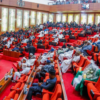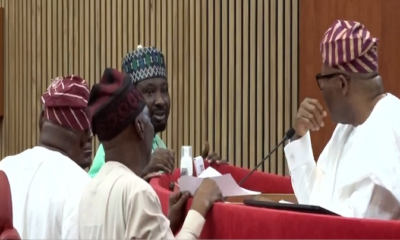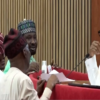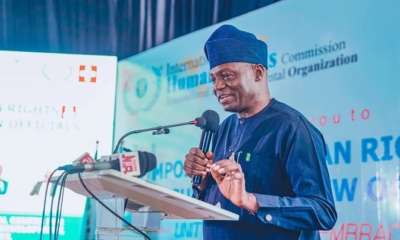Local News
PENGASSAN Slams Executive Order on Upstream Oil, Cites Security, Content Law Concerns
PENGASSAN criticises Tinubu’s Executive Order, warning it could hinder enforcement of Nigerian Content law in offshore oil operations.
The Petroleum and Natural Gas Senior Staff Association of Nigeria (PENGASSAN) has criticised the recent Executive Order signed by President Bola Tinubu to promote offshore oil and gas production in the country.
It said some aspects of the policy will have a restraining impact on enforcement of Nigerian Content law.
The new Executive Order, titled: “The Upstream Petroleum Operations Cost Efficiency Incentives Order (2025)” introduces performance-based tax incentives for upstream operators who deliver verifiable cost savings that meet defined industry benchmarks.
However, PENGASSAN said its major concern was in the aspect of the Executive Order that sought to reduce cost of production in the upstream by granting 20 per cent tax credit to oil production companies.
In the same vein, the association has accused the producers and dealers of Premium Motor Spirit (PMS) of exploitation by refusing to bring down the pump price of fuel in response to reduction in crude oil prices in the international market.
It blamed the regulatory agencies for abandoning their mandate to protect Nigerians from being shortchanged by profit-seeking oil companies.
Speaking at a Press Conference in Abuja on Monday, PENGASSAN president, Festus Osifo said that tax incentives granted to the oil companies by the President may not guarantee cost reduction unless security challenges are addressed.
He said one of the major cost elements presently driving high production cost in the upstream sector is insecurity and resources committed to protection of production facilities.
According to the PENGASSAN president, one of the major reasons some oil and gas operators, especially the international oil and gas companies are leaving Nigeria is principally because of insecurity.
“This is majorly because the cost of securing facilities, the cost of securing infrastructure in the Nigerian oil and gas industry has become prohibitive,” he said.
“We are saying that this may not be far reaching. This may not really work, because there are some foundational problems, and until these foundational issues are addressed, that cost may not necessarily reduce.
“For us, the policy is quite commendable, that is quite good. But, in reducing the cost of operations, there are some inherent challenges that over the years, PENGASSAN has drawn the attention of the government to issues we want it to address squarely. And chief among these issues is the level of insecurity that we have in the oil and gas industry.
“I mean, the insecurity in Nigeria has also dovetailed into the oil and gas industry. One of the challenges that is affecting us today in Nigeria oil and gas industry is that the cost that the upstream companies spend in protecting their facilities, in protecting their infrastructure, both in land, in sea, shallow waters, deep waters, etc., is quite prohibitive,” he said
He said that companies in the upstream sector have to put up with the challenge of securing their production facilities whereas in other countries, oil companies do not have to bear such a huge financial burden on security bills.
Osifo said that it is the responsibility of government to provide security and to secure oil production infrastructure in the country
For instance, Osifo said that for an average installation that is in offshore location, “you are going to realise that for one installation, you are going to have a minimum of three or four security vessels.
“These security vessels will be manned by Naval personnel. These security vessels, you pay for them on a daily basis. You pay for the crew on a daily basis as well. You have to fuel them on a daily basis. They are standing by and trying as much as possible to ensure that there is no intruder into these facilities. Whereas in other countries, it is not like that”.
He also faulted the aspect of the Executive Order that suggests that the Nigerian Content Development and Monitoring Board (NCDMB) could adopt a flexible approach in the enforcement of the provisions of its Act.
He said that “as long as that NCDMB Act is a law, it should be fully obeyed. An executive order cannot override a subsisting act. It is wrong”.
On the situation in the downstream petroleum sector in the country, Osifo said that PENGASSAN is sad that Nigerians were being exploited and not allowed to enjoy the full benefit of the deregulation of the sector.
He blamed the management of the Nigerian Midstream and Downstream Petroleum Regulatory Authority (NMDPRA) for failing in its regulatory responsibilities of ensuring compliance to price reduction in line with the dictates of market forces.
He said that whereas crude oil price recently came down to about $65 per barrel, there was no commensurate reduction in the pump price of PMS by marketers as expected under deregulation.
Against the background of fears of possible spike in the crude oil price as a result of the ongoing Israeli -Iranian conflict, Osifo said that it is the responsibility of the government and regulators to ensure that prices are not jerked up beyond market considerations.
“It is the function of the regulator to ensure that Nigerians are not exploited. So we have a call called NMDPRA to be neutral in discharging its responsibilities and to ensure that Nigerians are not exploited,” he said.
While responding to a question on the Memorandum of Understanding PENGASSAN reached with the Sterling Oil Company over their dispute, Osifo said the company accepted that it violated the Nigerian Content law and gave an undertaking to make amends.





















